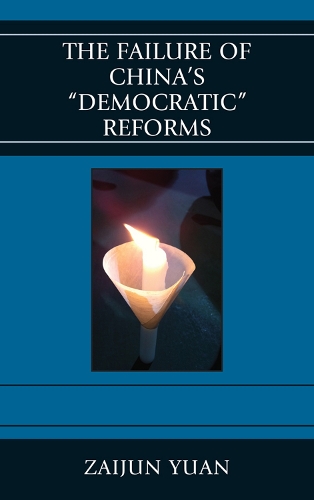
The Failure of China's Democratic Reforms
(Paperback)
Publishing Details
The Failure of China's Democratic Reforms
By (Author) Zaijun Yuan
Bloomsbury Publishing PLC
Lexington Books
28th August 2013
United States
Classifications
Professional and Scholarly
Non Fiction
320.951
Physical Properties
Paperback
194
Width 152mm, Height 229mm
Description
In its propaganda, the Chinese Communist Party does not deny the value of democracy, but it insists that democracy in China can be only socialist democracy with Chinese characteristics. The most essential nature of such democracy is that it is under the single-party system and it excludes multi-party politics and competitive elections. In recent years, Chinese democracy has won more support because of achievements the party has made in developing economy. This raises a question: does this efficient authoritarian political system in China, even if it is not democratic, deserve applause because it can facilitate economic development The party also insists that it is democratic. But, is the party's theory of democracy compatible with western democracy
Since 1998, the party has organized some political reforms, such as direct elections for township executives, direct elections for township party secretaries, township party congress reform and deliberative democracy experiments, while maintaining single-party politics. In the party's propaganda, some of these reforms have become party achievements in improving socialist democracy with Chinese characteristics. In addition to these four kinds of party-organized reforms, another reform originated from the grassroots, the participation of independent candidates in a few local people's congress elections.
This book examines these five local political reforms. It demonstrates that the four reforms instigated and organized by the party were tightly controlled and manipulated by the party. Although some reform measures may possibly liberalize parts of China's political mechanism, it is highly unlikely that the four reforms will eventually lead to political democratization in China. In the fifth reform, which was motivated from outside the bureaucratic system, the party took drastic measures to repress the political participation of grassroots power. As a result, nearly all independent candidates in the local people's congress elections failed in their attempts to gain office. The prospects for this reform are also poor. The book argues that all five reforms have failed and that none will lead to Chinas democratization in the near future. The book concludes that the partys authoritarian regime in China is by nature anti-democratic and that so-called socialist democracy with Chinese characteristics is not democratic.
Reviews
Yuan (Monash Univ., Australia) examines five types of political experiments at the local level in China over the past decade. They are direct popular election of township government executives, efforts to promote inner-party democracy, direct election of township party executives, reform of local party congresses, and independent candidate participation in local elections. Yuan finds in each case that the ruling party has used a variety of legal and illegal means to prevent or reverse outcomes unfavorable to the Communist Party of China (CCP). These means range from redistricting, to manipulating the nomination process, to intimidation and detention of nonpreferred candidates. Yuan concludes that the actions of the CCP and allied government officials have prevented these five types of experiments from making any of the hoped for contributions to the democratization of China. He even suggests that the propaganda apparatus of the CCP may have been the only beneficiary of these experiments, and that democracy may only come through a public uprising. While much of Yuan's fieldwork adds to the research base, the work is tedious reading. However, chapter 6 on independent candidates is a must read for serious, advanced students of Chinese politics. Thus, the work is recommended for scholars conducting similar research. Summing Up: Recommended. * Choice Reviews *
Despite the courageous efforts of democratically committed Chinese, Yuan meticulously reveals how the CCP's supposed democratic experiments offer no hope for democratization in authoritarian China. An important work. -- Edward Friedman, University of Wisconsin, Madison
This book offers an in-depth and well structured study on the 'democratic reforms' at different levels in post-Mao China. It is well grounded in theory and practice with empirical evidence and many insights into the 'democratic experiments' in China and its implications for the future. -- Sujian Guo
Zaijun Yuan spells it out reform by reform, election by election: The Chinese Communist Party is not leading Chinese democratization incrementally. As Yuan shows, the Party is fundamentally incapable of loosening its monopoly on power. A very important book at this moment in China'sand indeed the world'shistory. -- Dr. Joel Atkinson, Monash University
Author Bio
Zaijun Yuan was a lecturer in Chinese Studies at Monash University.
